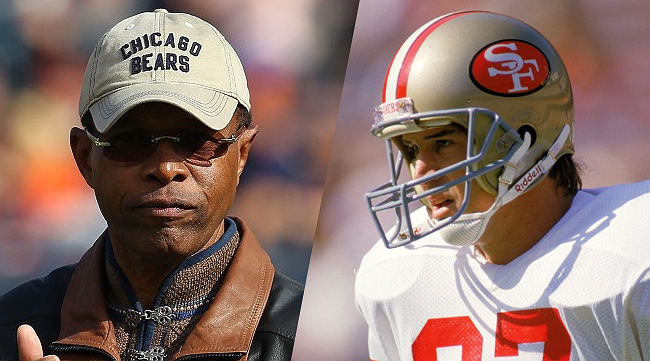
The NFL doesn’t exactly have a sterling reputation when it comes to dealing with former players with brain injuries that will impact them for the rest of their lives. It probably won’t change its stance here, because it never does, but hopefully the league will take care of Dwight Clark and Gale Sayers after the two announced that they have been diagnosed with brain diseases.
Clark, who is 60 and played with the San Francisco 49ers for nine years, announced on Twitter that he has been diagnosed with ALS.
I wanted to share some unfortunate news: I have ALS. https://t.co/RqU0fFT98g
— Dwight Clark (@DwightC87) March 20, 2017
Clark released a statement in the tweet, and while he said that it is “still very hard” to say that he was diagnosed with the condition, he told the story behind how he learned that he had Lou Gehrig’s disease.
In September of 2015, I started feeling weakness in my left hand. I was mildly paying attention to it because since
my playing days, I’ve constantly had pain in my neck. I was thinking it was related to some kind of nerve damage
because it would just come and go.After months of tests and treatment, I got some bad news. I was diagnosed with amyotrophic lateral sclerosis.
…
In addition to losing strength in my left hand – which makes opening a pack of sugar or buttoning my shirt impossible – I have now experienced weakness in my right hand, abs, lower back and right leg. I can’t run, play golf or walk any distances. Picking up anything over 30 pounds is a chore. The one piece of good news is that the disease seems to be progressing more slowly than in some patients.
Clark took on the elephant in the room: whether his time in the NFL led to the diagnoses. While he clarified that he doesn’t know for sure, the man who hauled in “The Catch” said that he believes it did, and he called on the NFL and the NFLPA to “continue working together in their efforts to make the game of football safer, especially as it relates to head trauma.”
Sayers is fighting a different battle, as he has been diagnosed with dementia. His wife, Ardythe, told The Kansas City Star that while her 73-year-old husband is physically healthy, “That brain controls everything, doesn’t it?”
Sayers, a Hall of Famer who played his entire seven-year career with the Chicago Bears, was diagnosed with the disease four years ago. As Ardythe said, doctors informed her that football played a role in his current condition.
“Like the doctor at the Mayo Clinic said, ‘Yes, a part of this has to be on football,’” Ardythe said. She also added that direct hits to the head weren’t necessarily the primary culprit, but rather, “It’s just the shaking of the brain when they took him down with the force they play the game in.”
We also learned about how this is impacting Sayers, and some of the details were terrifying.
On Wednesday, he scarcely spoke during a seven-hour visit by The Star.
But other times, he can hold halting conversations, and Ardie Sayers and friends believe there is a lot happening inside that he just can’t get out.
She tries to pry that loose, or at least prime it, by seeking to engage his mind with anything from jigsaw puzzles to a documentary about Jacqueline Kennedy she hoped might draw out some memories.
That’s why she has been moving him home from a facility he’d been staying in for the last few months, and it’s why she works with him at such things as practicing signing his name.
There are a disturbingly high number of cases of former NFL players whose brains have deteriorated after their football careers. In fact, some players have hung up their cleats early in an attempt to protect their brains. As we stated earlier — the NFL’s record with supporting former players isn’t great, nor is it great when those players start suffering from conditions like CTE and dementia. We have no reason to believe this will happen because the league’s attitude towards these cases never changes, but ideally, the cases of Clark and Sayers will lead to the NFL offering more support its former players.






